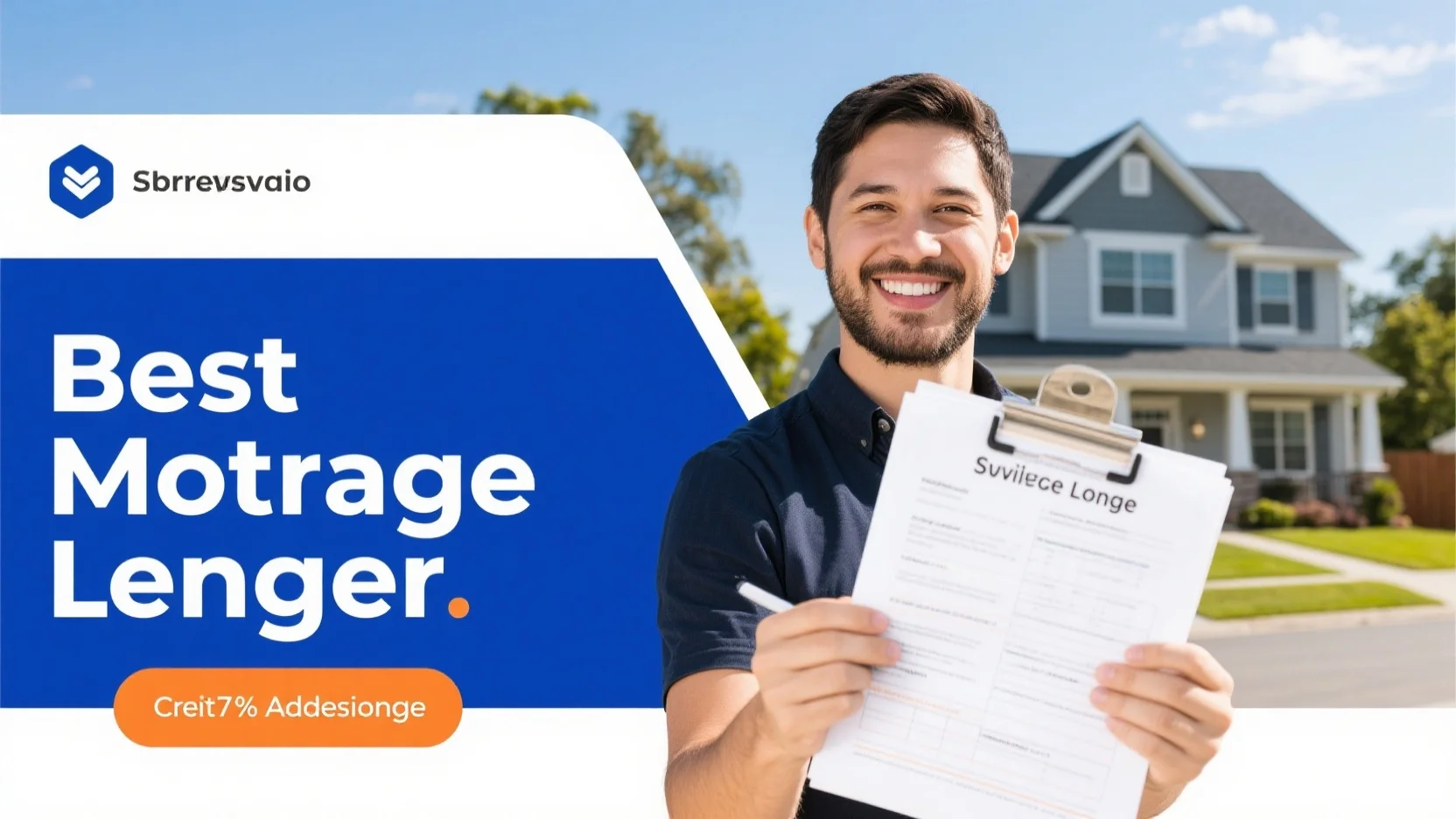
Best Home Loan Providers for Self-Employed Individuals in 2025

Image Source: pexels
Finding the right home loan lender is crucial for self-employed individuals. They often deal with changing income, stricter checks, and more paperwork. The best mortgage lenders for self-employed individuals might ask for bigger down payments or closely examine debts. However, the best lenders make this process easier with tailored solutions just for you.
Key Takeaways
- People who work for themselves can try CrossCountry Mortgage or New American Funding. These lenders offer flexible loans for different income types.
- Collect important papers like tax forms and bank records. This helps make the loan process easier and boosts your chances of approval.
- Pick lenders who know self-employment is tricky. They have special loans that make checking income simpler and help you buy a home.
Best Mortgage Lenders for Self-Employed Individuals in 2025
Overview of the top lenders
If you’re self-employed, picking a mortgage lender can be tough. Some lenders focus on helping people like you. They offer flexible loans and different ways to check income. Here are some top mortgage lenders for self-employed individuals in 2025:
- Acra Lending : Offers 12-Month Bank Statement Loans, ATR-in-Full Loans, and 1099 Only Loans.
- A &D Mortgage: Provides DSCR Loans, Profit & Loss Loans, and Asset Utilization Loans.
- Guaranteed Rate : Focuses on non-QM loans and bank statement loans for self-employed borrowers.
- Change Home Mortgage : Features Community Mortgages and Alt-Doc Programs.
- United Wholesale Mortgage : Has many loan options for self-employed individuals.
These lenders are great because they understand your unique struggles. They know about changing income and unusual paperwork needs.
Key factors that make these lenders stand out
The best lenders for self-employed people are good in key areas. First, they have experts who handle tricky financial situations. Second, they are clear about their rates, so there are no surprises. Many of these lenders have won awards and great reviews for their service.
Their loan programs are flexible, like bank statement loans or profit and loss-based loans. These make income checks easier. They also focus on being inclusive, so you feel supported. Choosing one of these lenders gives you custom solutions to help you own a home.
Detailed Profiles of the Best Mortgage Lenders for Self-Employed Individuals
CrossCountry Mortgage: Best Overall Lender
CrossCountry Mortgage is a top choice for self-employed people. It has many loan options made just for you. One option is Bank Statement Loans, where you use bank statements instead of tax returns to show income. Freelancers and contractors can also use the Alt Doc – 1099 Mortgage Program.
Here’s why CrossCountry Mortgage is special:
| Feature/Loan Option | Description |
|---|---|
| No job or income proof needed | Makes applying easier for self-employed borrowers. |
| Minimum credit score of 580 | Low credit score requirement for more accessibility. |
| One year of self-employment income history | Requires less income history than most lenders. |
| Bank Statement Loans | Use bank statements to prove your income. |
| Asset Qualifier Mortgages | Qualify based on assets, not income. |
| Full Doc Loans | For those who can provide full paperwork. |
| Investor Cash Flow Loans | For real estate investors based on property cash flow. |
| Alt Doc – 1099 Mortgage Programs | Perfect for freelancers with 1099 income. |
These features make CrossCountry Mortgage a great pick for easy and flexible loans.
New American Funding: Favorable Terms for Self-Employed Borrowers
New American Funding offers great terms for self-employed borrowers. It provides Non-QM loans, which are good for people with changing or unique incomes. You can verify income through bank statements or a one-year tax return.
Here’s what they offer:
| Feature | Description |
|---|---|
| Loan Type | Non-Qualified Mortgage (Non-QM) |
| Income Verification Methods | Full Documents, One-Year Tax Return, Bank Statements (6 or 12 months), Asset Qualification |
| Eligible Income Sources | Self-employed, changing incomes, assets without income, etc. |
| Loan Usage | Buy or refinance homes, second homes, or investment properties |
This lender’s flexibility makes it a top choice for self-employed borrowers.
Truss Financial Group: Tailored Loan Options
Truss Financial Group helps self-employed people without regular income proof. They offer personal service and many loan choices, like stated income and bank statement loans.
Key features include:
- 90% Loan to Value
- 600+ Credit Score
- Loans up to $10M
- No Tax Returns Needed
- Access to Stated Income Lenders
Truss Financial Group also gives competitive rates, so you get a great deal.
Rocket Mortgage: High Customer Satisfaction
Rocket Mortgage is loved for its happy customers. It makes the loan process simple for self-employed people. They focus on solving your unique problems and making things easy.
Key highlights include:
- Help with approvals when other lenders say no.
- Flexible options to fit your needs.
- A smooth process to lower stress for self-employed borrowers.
Rocket Mortgage’s focus on customer happiness makes it a trusted choice.
How to Pick the Right Lender for You
Things to think about, like income checks
When picking a lender, know how they check income. Self-employed people often face tougher rules. Many lenders ask for several years of tax returns, profit and loss reports, and bank records. If you take big tax deductions, your income might look smaller, which could hurt your chances.
Some lenders have easier options, like bank statement loans or loans based on profit and loss. These let you qualify without regular tax papers. Choose lenders who work with self-employed people often. They understand changing incomes and can help you through the steps.
Credit score and money history tips
Your credit score matters a lot for getting a home loan. Most lenders want at least a 620 score, but higher scores help you get better deals. Pay bills on time and lower your debts to keep your record clean.
Lenders also check your debt-to-income ratio (DTI). A low DTI shows you handle money well. If your credit score is low, try using tools or talk to an advisor to improve it.
Loan choices and flexibility for self-employed people
Good lenders for self-employed people offer flexible loans. Non-conforming loans don’t follow strict rules, so they work for special cases. Flex loans are good for incomes that change, and asset-based loans use your savings to qualify.
Some lenders also have profit and loss loans with less paperwork. These make it easier to find a loan that works for you. Compare lenders to pick one with the right mix of options and costs.
Comparison Table of Top Lenders
Main features, benefits, and drawbacks of each lender
Picking the right lender means knowing their good and bad points. Below is a table showing the main features, benefits, and drawbacks of top lenders for self-employed people:
| Lender | Key Features | Pros | Cons |
|---|---|---|---|
| CrossCountry Mortgage | Bank Statement Loans, Alt Doc – 1099 Programs, Asset Qualifier Mortgages | Easy income checks, accepts lower credit scores | Some loans may need bigger down payments |
| New American Funding | Non-QM Loans, Bank Statement Verification, Asset Qualification | Great for unusual incomes, offers refinancing options | Fewer physical branch locations |
| Truss Financial Group | Stated Income Loans, No Tax Returns Needed, Loans up to $10M | High loan amounts, good interest rates | Needs a credit score of at least 600 |
| Rocket Mortgage | Simple application process, flexible loan choices | Top-notch customer service, easy-to-use online tools | Fewer non-QM loan options compared to others |
| Guaranteed Rate | Bank Statement Loans, DSCR Loans | Clear pricing, custom solutions for self-employed borrowers | May have stricter rules for debt-to-income ratios |
This table shows what each lender offers, helping you decide based on your needs.
Comparing rules and loan terms
Knowing the rules for getting a loan is very important. Most lenders have specific requirements. Here’s a simple breakdown of common rules:
| Criteria | Details |
|---|---|
| Employment History | Usually need two years of steady self-employment. One year may work with related experience. |
| Credit Score | A score of 620 or higher is often needed. |
| Debt-to-Income Ratio (DTI) | Should be under 43%. |
| Stable Income and Cash Flow | Must show steady income for at least two years. |
| Down Payment | As low as 3% for regular loans or 3.5% for FHA loans. |
| Additional Savings | Some lenders want savings to cover 6–12 months of payments. |
Meeting these rules can improve your chances of approval. Lenders like CrossCountry Mortgage and New American Funding are flexible with income checks, which helps if your income changes. Always check the specific rules of your chosen lender to make sure you qualify.
Step-by-Step Guide to Applying for a Mortgage as a Self-Employed Individual
Getting your financial papers ready
The first step is to gather your financial papers. Lenders need proof of income and money stability. If you’re self-employed, collect these:
- Personal and Business Tax Returns: Show at least two years of steady income.
- Profit and Loss Statements : These show how well your business is doing.
- Bank Statements : Provide 12–24 months to prove savings and cash flow.
- K-1 Statements : Include these if you earn from partnerships.
- IRS Form 4506-T : Lets lenders get your tax records directly from the IRS.
Having these papers ready will save time and make things easier.
Knowing how lenders check income
Lenders check income more closely for self-employed people. They want to see steady earnings for at least two years. If your income changes a lot, they might average it. Some lenders offer options like bank statement loans or profit and loss loans. These need less traditional paperwork.
Be ready to explain any income gaps or unusual money activity. Keeping clear records will help meet lender needs.
Ways to improve your chances of approval
Use these tips to increase your chances of getting approved:
- Raise your credit score by paying bills on time.
- Lower your debt by avoiding new loans and paying off balances.
- Save more for a bigger down payment, like 10%–20%.
- Take fewer tax deductions to show higher income.
- Keep records of contracts and jobs to prove steady work.
- Work with a mortgage broker who knows self-employed needs.
These steps will help you look better to lenders and get approved faster.
The best lenders for self-employed people in 2025 provide special options. These include loans like bank statement, asset-based, and profit & loss loans.
“Since income checks differ by lender, self-employed borrowers should choose one that understands their unique situation.”
Start now by looking into lenders who support your needs. 🏡
FAQ
What papers do you need to get a mortgage if you’re self-employed?
You’ll need tax returns, bank statements, profit and loss reports, and maybe IRS Form 4506-T. These papers show lenders your income and money stability.
Can you get a mortgage if your income changes a lot?
Yes, you can. Some lenders average your income over two years or let you use bank statement loans. These are good for self-employed people with changing earnings.
How can you make it easier to get approved for a mortgage?
Save more for a bigger down payment, raise your credit score, and lower your debt. Keeping clear financial records helps lenders see your income better.
💡 Tip : Choose lenders who know how to help self-employed borrowers. They offer special loans for your unique money needs.
